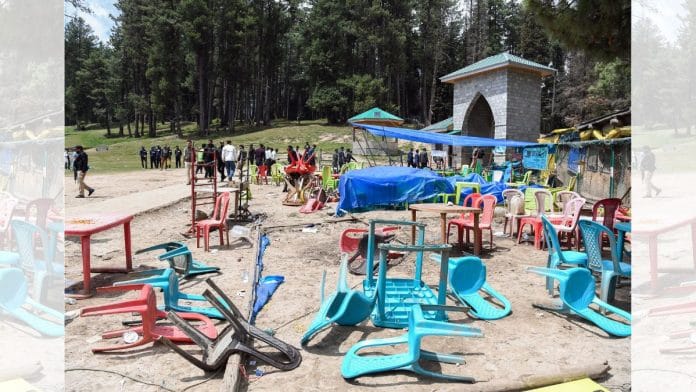Thank you dear subscribers, we are overwhelmed with your response.
Your Turn is a unique section from ThePrint featuring points of view from its subscribers. If you are a subscriber, have a point of view, please send it to us. If not, do subscribe here: https://theprint.in/
ThePrint’s recent portrayal of fact-checker Mohammed Zubair as the “Chief of Information War” during Operation Sindoor night demands a more nuanced examination. While Zubair’s efforts to debunk misinformation during this critical military operation deserve recognition, the elevation of his status to that of a heroic figure is both premature and problematic, especially when viewed against his checkered history in the fact-checking domain.
The article frames Zubair as a valiant defender against disinformation, noting that “his all-night heroic effort on the frontlines of the disinformation war launched by Pakistan is being showered with praise.” This narrative, while perhaps appealing in the context of national sentiment, glosses over a troubling pattern of selective fact-checking that has characterized much of his work.
Documenting misinformation is crucial, particularly during conflict, when tensions run high. Without question, Zubair’s work during Operation Sindoor provided a valuable service, helping to distinguish between authentic information and Pakistani propaganda. This contribution should not be diminished. However, we cannot overlook the many instances where Zubair has been accused of spreading misleading information or engaging in selective fact-checking that appears to advance certain ideological positions. Analysis of his work reveals a pattern of bias, with reports from various sources documenting cases where his fact-checks omitted crucial context or presented incomplete information.
Perhaps the most concerning aspect of Zubair’s fact-checking career was his role in the 2022 Nupur Sharma controversy, where his actions had far-reaching consequences. On May 27, 2022, he shared a video clip of Sharma’s comments from a TV debate, with a caption condemning Indian television debates as platforms for hate speech. While sharing factual information is part of a fact-checker’s job, the selective amplification of this particular clip without the full context of the heated debate led to an international firestorm.
The consequences were severe – diplomatic tensions with multiple countries, violent protests across India, and death threats against Sharma that forced her into hiding. Two individuals, Umesh Kolhe in Amravati and Kanhaiya Lal in Udaipur, were brutally murdered for allegedly supporting Sharma’s comments. While Zubair cannot be held directly responsible for these tragic outcomes, his role in amplifying the controversy without considering the potential ramifications demonstrates a concerning lack of judgment for someone positioned as an objective fact-checker.
In other cases, Zubair has been accused of selectively omitting critical details that would provide essential context. An examination of his work reveals multiple instances where allegations of communal bias were raised due to how he framed particular incidents. Reports have documented at least 40 instances of potentially misleading or incomplete fact-checking by Zubair, ranging from the Karnataka hijab controversy to claims about political figures and events.
It’s worth noting that while hundreds of internet users were actively debunking misinformation during Operation Sindoor, Zubair primarily amplified these efforts. His role, while valuable, was not as singular or heroic as the article suggests. The collective effort of numerous anonymous digital citizens who worked tirelessly to separate fact from fiction deserves equal, if not greater, recognition.
The fact-checking enterprise in India is complex and fraught with challenges. Alt News, the platform co-founded by Zubair, has been accused by critics of displaying ideological bias in its approach to fact-checking. While some dismiss these accusations as politically motivated, the pattern of complaints merits serious consideration, especially when evaluating the credibility of those positioned as arbiters of truth.
This brings us to a broader concern about the concept of “fact-checking” itself. The term suggests an unassailable objectivity that rarely exists in complex situations. We’ve witnessed the rise of fact-checking organizations functioning as new gatekeepers, positioning themselves as impartial arbiters while often operating with their own unstated biases and ideological frameworks. The business model claims to settle complex disputes with simple verdicts: “True,” “False,” or “Misleading.” Yet this misunderstands controversies that often involve competing interpretations rather than straightforward factual disagreements. What’s labeled “misinformation” is sometimes merely an alternative perspective challenging dominant narratives.
The uncritical hero worship of fact-checkers undermines the very skepticism that should underpin fact-checking. When we elevate individuals to heroic status without scrutinizing their track record, we risk creating a false hierarchy of credibility that damages public trust. The irony is palpable: fact-checkers demand skepticism toward others’ claims while expecting immunity from scrutiny themselves.
While Zubair’s efforts to combat misinformation during Operation Sindoor deserve recognition, the framing of his work as “heroic” without acknowledging valid concerns about his broader approach does a disservice to the critical discourse needed in our information landscape. A more balanced assessment would recognize both his contributions during this specific event and the legitimate questions about the consistency and impartiality of his wider body of work. In a democracy, no purveyor of information should be beyond scrutiny—especially those who position themselves as guardians against misinformation.
These pieces are being published as they have been received – they have not been edited/fact-checked by ThePrint.


